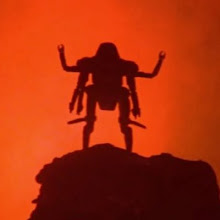 Photograph of Ice Cube, taken during his set at Lollapalooza '92, on Saturday, September 5, 1992 at the Fort Bend County Fairgrounds in Rosenberg, Texas (just outside of Houston, Texas).
Photograph of Ice Cube, taken during his set at Lollapalooza '92, on Saturday, September 5, 1992 at the Fort Bend County Fairgrounds in Rosenberg, Texas (just outside of Houston, Texas).In my Lollapalooza '92 posts, I've been quoting the original concert review of Marty Racine of the Houston Chronicle. He summed up Ice Cube's set as follows:
By evening the program's pace had been derailed by about 20 minutes, and it was left to Ice Cube (7:35-8:20 p.m.) to appear after a quick 15-minute break and restore the schedule.At least in 1992 I could admit I knew nothing about Ice Cube, or even rap in general. Reading Racine's review fifteen years later, it seems that he desperately attempted to muster three vague and general paragraphs about a performer about whom he knew very, very little (all the while refusing to admit his lack of knowledge). Note that no album or song by Ice Cube is mentioned by specifically by name, nor is his association with N.W.A. (Of course, Racine didn't have ready access to the Wikipedia back in September of 1992, but that's no excuse for trying to disguise one's ignorance of a performer as social or musical commentary.).
Now, we can all argue about whether rap is music. It lacks certain sonic elements but is still based on composition. Call it poetry (of the streets), performed, like all live poetry, with an emphasis on cadence. Regardless, Cube's appearance made the necessary connection to black pop culture, in turn providing a legitimacy to alternative rock and its claim on the fifth or sixth rock generation.
Cube and his army got down with the four-syllable cuss words, but the mood was more celebratory than angry. Thousands of pale fists pumped the air as Cube went strutting, the affair turning into pure pop theater. And when Cube rousted a rap-along with the crowd that pretty much dissed Cube himself, we found the Ice Man to be of fine humor.1
And, yes, the photograph above was indeed taken by me, using my photo pass.
1. Racine, Marty. " Lollapalooza!/The music is a decidedly hip, high-strung hybrid of rap, funk and hard, linear beats, laced with a requisite dose of attitude. 'Lots' of 'tude/New generation finds its alternative," Houston Chronicle, September 7, 1992.





1 comment:
By 1992 there was very little reason for any music critic to remain ignorant of Ice Cube.
I was no rap aficionado at this Lollapalooza, but arguing whether rap was music by 1992 was a moot argument, especially in the city which produced The Ghetto Boys.
By 1992, rap had already been co-opted by producers who were giveing us product like Vanilla Ice (and oddball novelty acts like Snow and Gerardo would soon be foisted upon MTV). Rap as music was a closed case.
Most importantly, Ice Cube was a member of NWA, arguably one of the most successful acts of the time, with NWA's "Straight Outta Compton", dominating charts in 1988. Whether the critic was a fan of rap or not, he'd somehow missed the massive shift occurring in the music industry.
However, the review is of its time, when rap was still looked upon with considerable suspicion by the guard who had been extolling the virtues of rock for years.
Post a Comment